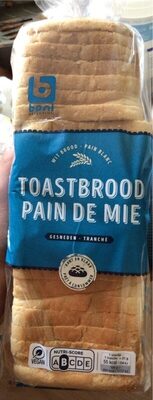
Barcode: 5400141605365
Pain de mie
DOUBTFUL
📝 Reason: Certain ingredients have disputed status among Islamic scholars. Their acceptability may vary by school of thought and regional certification standards.
🏷️ Category: Plant Based Foods And Beverages, Plant Based Foods, Cereals And Potatoes, Breads, Sliced Breads, Bran Sliced Breads
📄 Certificates: Vegetarian, Vegan, Nutriscore, Nutriscore Grade B
Ingredients:
Details
Understanding the Halal Status of Pain de mie
Pain de mie is a type of soft, sliced bread that is frequently enjoyed in various dishes. However, for many consumers adhering to halal dietary guidelines, understanding the halal status of this product is essential. Currently, the Halal status of Pain de mie is classified as DOUBTFUL. This classification arises due to specific ingredients within the product that may have disputed opinions among Islamic scholars.
Ingredients Breakdown
The ingredients in Pain de mie include:
- 66% wheat flour (gluten)
- Water
- Sugar
- Yeast
- Rapeseed oil
- Salt
- Emulsifier (E471)
- Preservative (E282)
- Wheat gluten
- Flour treatment agent (E300)
- May contain traces of eggs and milk
While many of these ingredients are generally considered permissible in Islam, others require a closer examination to determine their halal status.
Ingredients Evaluated
Let’s dive deeper into the specific ingredients and their halal status:
- 66% Wheat Flour (Gluten): This component is permissible in Islam.
- Water: Fully permissible, as it contains no harmful substances.
- Sugar: Considered halal and is widely used in various food products.
- Yeast: Recognized as a halal ingredient essential for bread-making.
- Rapeseed Oil: Permissible for consumption according to Islamic guidelines.
- Salt: Naturally halal and a common food additive.
- Emulsifier (E471): This ingredient has a complex status. While it can come from plant or animal sources, without proper certification, its halal status remains questionable, hence the doubtful classification.
- Preservative (E282): Generally considered halal as it fits the criteria for preservatives allowed in Islamic dietary laws.
- Wheat Gluten: Also permissible and found in various baked goods.
- Flour Treatment Agent (E300): This vitamin C agent is halal, but it’s essential to check for specific product certifications.
Additionally, Pain de mie may contain traces of eggs and milk, making it unsuitable for those with allergies or strict dietary requirements.
Brand and Certification Context
Currently, the Pain de mie does not carry any specific halal certifications. While it is categorized under several classifications such as Plant-Based Foods, Cereals, and Breads, the absence of a halal certification adds to the doubt surrounding its halal claim. It’s worth noting that the product is certified vegetarian and vegan, receiving a Nutriscore Grade B, indicating a relatively health-conscious formulation, yet this does not address the halal validity.
Your Dietary Choices
When discussing the halal status of food products like Pain de mie, it is crucial to stay informed about the ingredients and their origins. Because there are diverse opinions among Islamic scholars, personal beliefs, and regional standards may influence your decision to consume this product. For those looking for halal bread alternatives, consider searching for products explicitly marked with halal certification.
Final Thoughts
In conclusion, Pain de mie remains a popular bread choice, but its halal status remains contentious due to specific ingredients, especially emulsifiers. If maintaining a strictly halal diet is crucial for you, seeking halal-certified alternatives is advisable. Always check labels and certifications to ensure compliance with your dietary needs.
